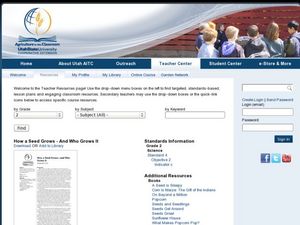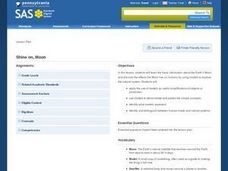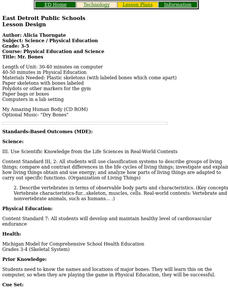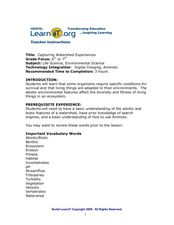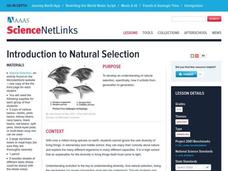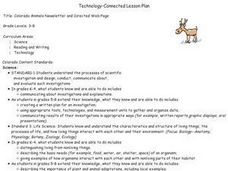Zebrafish in the Classroom
Worksheet on Genetics for Kindergarteners
Introduce the concept of genetics to your kindergartners with a science experiment about chromosomes in fish. After a quick overview of what chromosomes are, learners color different chromosomes to show that they come from the mom or the...
San Francisco Public Utilities Commission
What is Drought? No Rain, No Water
How can climate change affect our water supply? Have kids read a passage about the water cycle and water conservation, which includes six questions that challenge them to use context clues.
Curated OER
How a Seed Grows: And Who Grows It
Second graders explore botany by viewing video clips in class. In this seed growth lesson plan, 2nd graders identify the types of seeds that grow specific plants and what the optimal conditions are for growing seeds. Students view a...
Curated OER
1,000 Cranes Lesson Plan
Students improve their motor skills through cafeful folding, a discipline necessary in the practice of origami. They develop multicultural awareness by exploring Japanese history. Students improve their ability to follow directions...
Pennsylvania Department of Education
Pennsylvania’s Energy Supply
Third graders become familiar with the various types of energy and which types are found in Pennsylvania. In this Pennsylvanian energy resources lesson, 3rd graders, identify wind and water as sources of energy. Students complete an...
Pennsylvania Department of Education
Wind and Water Wheels
Students identify wind and water as natural resources that create energy. In this natural resources and energy use lesson, students work in groups to construct a pinwheel, then explore the effects of wind and water on the pinwheel....
Curated OER
Shine On, Moon
Students explore space science by conducting an experiment in class. In this Moon lesson, students define a list of space science vocabulary and read the book The Moon. Students utilize shoeboxes and string to conduct a sunlight...
Curated OER
Natural Figures
First graders look for geometrical shapes in nature to help them appreciate the diversity of the natural environment.
Curated OER
Recyclers to the Rescue
Fifth graders examine the concept of the food chain and define producer, consumer, herbivore, carnivore, and omnivore. They draw a food chain for a mouse and discuss the different organisms involved in the chain, and conduct an...
Curated OER
Frog Metamorphosis
Students play 20 Questions with animal characteristics and then view an animation of how a tadpole changes into a frog. They consider the importance of camouflage to frogs and write out the story of a frog from tadpole to adult.
Curated OER
First Place Foods
First graders identify healthy foods. In this nutrition lesson plan, 1st graders create a Venn diagram to compare and contrast healthy foods. Students place foods in the proper circle.
Curated OER
Seine for Bugs
Students make their own seine net to catch fish in the water. In this seine let lesson plan, students follow directions to make the net and then use it in the water.
Curated OER
Mr. Bones
Young scholars play CD-ROM game My Amazing Human Body, and participate in relay game in Phys. Ed. where they put together skeleton on which body parts are labeled.
Curated OER
Woodland Animals and Their Habitat
Learners explore the natural environment through a video and nature sounds tape. They keep journal's of the unit's activities and vocabulary terms. They play a web of interdependence game and compose a list of forest animals and write...
Curated OER
Teaching Kids about the Environment
Fifth graders identify the species of plants and animals found in an environment. They compare these findings to plant and animal species found in an unlike environment. Students acquire and compare soil samples from the two sites chosen.
Curated OER
Good Manners: Taxonomy Questions
In this good manners reading comprehension worksheet, students read a realistic story about the importance of good manners. Students then answer 30 taxonomy questions: synthesis, analysis, application, comprehension and evaluation.
Curated OER
Where in the World? Biomes of the Earth
Learners research a biome. In this biomes of the Earth lesson, students discuss what they already know about ecology and view pictures of different biomes. Learners work in groups to research a different biome. Students use the...
Curated OER
What Can We Learn from Artifacts?
Students examine how artifacts are discovered and explore their significance as it pertains to gathering important information. In this artifacts lesson, students obtain knowledge about the way artifacts are excavated and examine an...
Curated OER
Dinosaurs 1: Where Are the Dinosaurs?
Learners explore the time of the dinosaurs. In this extinction lesson plan, students watch a video clip about different dinosaurs and are asked about what they observed. Learners talk about how dinosaurs hatched from eggs and compare...
Curated OER
Sprinkles 5
In this environment learning exercise, students read the information and complete the survey about their own local habitats and some of the others in Florida.
Curated OER
Capturing Watershed Experiences
Students observe organisms found in the water. In this lesson on organisms, students collect water from local streams and tributaries in order to study the organisms found in the water. As a culminating activity, students create a...
Curated OER
Introduction to Natural Selection
Students develop an understanding of natural selection, specifically, how it unfolds from generation to generation. They work in small groups to perform an experiment using beans. They use a worksheet imbedded in this plan to guide their...
Curated OER
Colorado Animals Newsletter and Directed Web Page
Students select a Colorado animal, develop a Directed Web page, and research their animal. Each member of the group combine their research and develop a Newsletter.
Curated OER
Definition of Philanthropy
Students discover philanthropy. For this service learning lesson, students read literature and discuss occurrences of people sharing their time, talent, and treasure. Students respond, in writing, to the theme of philanthropy in a...




